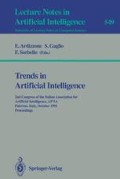Abstract
In this paper, we describe an algorithm for the abstract interpretation of hybrid knowledge bases which comprise both frame and rule-based representations. The program, HybAbs, can automatically analyse hybrid knowledge bases for completeness and correctness, and provides a significant improvement over earlier approaches which can only cope with homogeneous representations. Furthermore, because HybAbs considers the procedural semantics of the hybrid system, it can identify classes of incomplete and incorrect knowledge bases which would elude purely declarative approaches.
Preview
Unable to display preview. Download preview PDF.
References
Beauvieux, A. (1990). A General Consistency (Checking and Restoring) Engine for Knowledge Bases. Proceedings of the 9th European Conference on Artificial Intelligence. Stockholm, Sweden.
Eisenstadt, M., Domingue, J., Rajan, T., and Motta, E. (1990). Visual Knowledge Engineering. IEEE Transactions on Software Engineering, 16(10). October 1990.
Evertsz, R. (1989). The Generation of ‘Critical Problems’ by Abstract Interpretations of Student Models. Proceedings of the 11th International Joint Conference on Artificial Intelligence. Detroit, pp 483–488.
Evertsz, R. (1990). The Role of the Crucial Experiment in Student Modelling. Doctoral Dissertation (and forthcoming CITE Report), IET, The Open University, UK
Evertsz, R. (1991). The Automated Analysis of Rule-based Systems Based on their Procedural Semantics. Proceedings of the 12th International Joint Conference on Artificial Intelligence. Sydney, Australia.
Forgy, C.L. and McDermott, J. (1977). OPS, a domain-independent production system language. Proceedings of the 5th International Joint Conference on Artificial Intelligence. Cambridge, MA.
Frisch, A. and Cohn, T. (1991). 1988 Workshop on Principles of Hybrid Reasoning, AI Magazine, 11(5).
Mellish, C.S. (1986). Abstract Interpretation of Prolog Programs. Proceedings of the 3rd International Conference on Logic Programming. London, Spriger-Verlag, pp463–474.
Motta, E. (1990). The FLIK Handbook. Technical Report no. 65, Human Cognition Research Laboratory, The Open University, Milton Keynes, U.K., 1990.
Motta, E., Rajan, T., Domingue, J., and Eisenstadt, M. (1990). Methodological Foundations of KEATS, The Knowledge Engineers Assistant. Proceedings of the European Workshop on Knowledge Acquisition, Amsterdam, The Netherlands, June 1990. Also to appear in the Knowledge Acquisition Journal.
Nado R., and Fikes R. (1987). Semantically Sound Inheritance for a Formally Defined Frame Language with Defaults. Proceedings of AAAI '87, Seattle, Washington.
Nguyen, T.A., Perkins, W.A., Laffey, T.J & Pecora, D. (1985). Checking an expert system knowledge base for consistency and completeness Proceedings of the 9th International Joint Conference on Artificial Intelligence. Los Angeles, CA.
O'Leary, D.E. (1990). Verification of Frame and Semantic Network Knowledge Bases. Proceedings of the 5th Knowledge Acquisition for Knowledge-Based Systems Workshop. Banff, Canada, November 1990.
Suwa, M., Scott, A.C. & Shortliffe, E.H. (1982). An approach to verifying completeness and consistency in a rule-based expert system AI Magazine, pp16–21.
Vignollet, L., and Ayel, M. (1990). A Conceptual Model for Building Sets of Test Samples for Knowledge Bases. Proceedings of the 9th European Conference on Artificial Intelligence. Stockholm, Sweden.
Yen, J., Neches, R., and MacGregor, R. (1988). Classification-based Programming: A Deep Integration of Frames and Rules. Tech. Report ISI/RR-83-213, USC/Information Sciences Institute, March 1988.
Author information
Authors and Affiliations
Editor information
Rights and permissions
Copyright information
© 1991 Springer-Verlag Berlin Heidelberg
About this paper
Cite this paper
Evertsz, R., Motta, E. (1991). The abstract interpretation of hybrid rule/frame-based systems. In: Ardizzone, E., Gaglio, S., Sorbello, F. (eds) Trends in Artificial Intelligence. AI*IA 1991. Lecture Notes in Computer Science, vol 549. Springer, Berlin, Heidelberg. https://doi.org/10.1007/3-540-54712-6_227
Download citation
DOI: https://doi.org/10.1007/3-540-54712-6_227
Published:
Publisher Name: Springer, Berlin, Heidelberg
Print ISBN: 978-3-540-54712-9
Online ISBN: 978-3-540-46443-3
eBook Packages: Springer Book Archive

